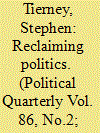| Srl | Item |
| 1 |
ID:
138875


|
|
|
|
|
| Summary/Abstract |
Drawing on the distinction between self-rule and shared rule in multilevel states, this article argues that shared rule has been the neglected element of the UK devolution settlement. The ability of the devolved administrations to participate in, and influence, national decision making through shared rule mechanisms is very limited. The article argues that the lack of shared rule is especially problematic in light of the increasing complexity of the Scottish devolution settlement in the wake of the Scotland Act 2012 and the Smith commission report. Smith, in particular, seems set to increase both the power of the Scottish Parliament and its dependence on UK policy decisions in the areas of tax, welfare and the economy. Creating a more robust intergovernmental system which could manage these new interdependencies will be a significant challenge, and yet, without such a system, the new settlement will be difficult to sustain.
|
|
|
|
|
|
|
|
|
|
|
|
|
|
|
|
| 2 |
ID:
138879


|
|
|
|
|
| Summary/Abstract |
Referendums are often criticised for being elite-controlled and undeliberative. This article argues that the detailed, multiactor regulation of the Scottish referendum resulted in an elaborate legal regime which helped to overcome these potential pathologies, diluting executive control and facilitating an exercise in national public engagement. It addresses the troubled history of referendum use in the UK and contends that the Scottish process may well transform how referendums are now viewed. Indeed, one outcome of the Scottish process is likely to be a greater demand at UK level for the use of direct democracy in processes of significant constitutional change. It is by no means certain, however, that these demands for greater popular engagement in the process of constitutional change will be met, particularly when we consider the Smith Commission process, which marks a return to elite interparty bargaining.
|
|
|
|
|
|
|
|
|
|
|
|
|
|
|
|